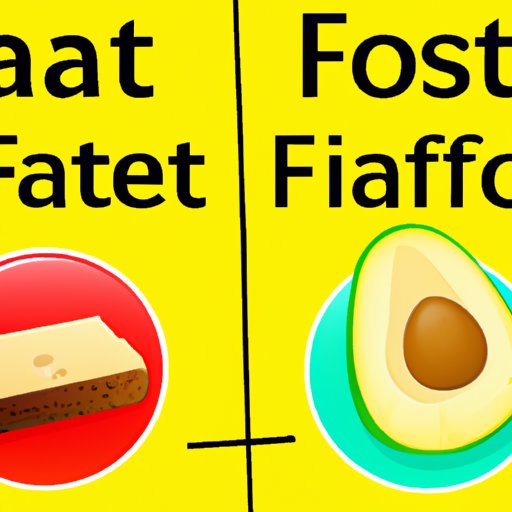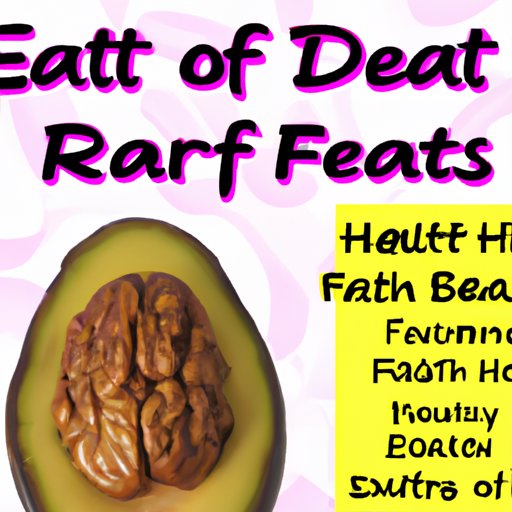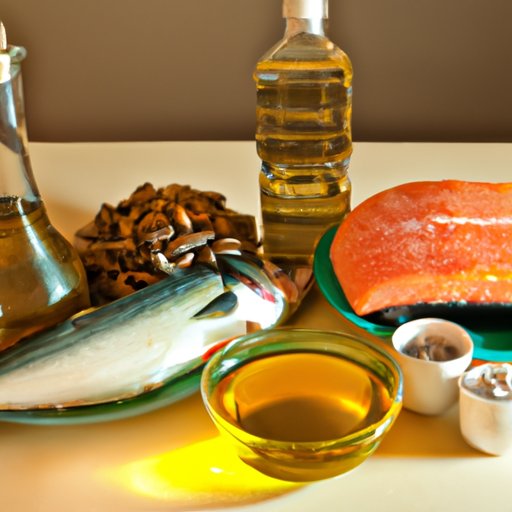Introduction
When it comes to eating a healthy diet, there is often confusion surrounding fats. Are they good or bad for us? Do we need to avoid them altogether, or can they be beneficial in moderation? The truth is that not all fats are created equal, and understanding the differences between them can help you make informed decisions about how to include them in your diet.
Overview of the Role of Fats in a Healthy Diet
Fats are an important part of a balanced diet and provide essential nutrients to our body. They are necessary for absorbing certain vitamins, maintaining cell structure, and providing energy. However, some fats are healthier than others, so it is important to understand the different types and their effects on our health.

Summary of the Pros and Cons of Eating Fat
On the one hand, some types of fat can be beneficial in moderation. Certain fats such as omega-3 fatty acids, monounsaturated fats, and polyunsaturated fats have been linked to improved cognitive function and cardiovascular health. On the other hand, consuming too much saturated fat or trans fat can lead to an increased risk of heart disease and stroke, so it is important to limit these types of fat in your diet.

The Benefits of Healthy Fats for Brain and Heart Health
Omega-3 fatty acids are essential for maintaining good cognitive function, as they play a role in regulating inflammation and improving communication between cells in the brain. Foods that are rich in omega-3s include salmon, mackerel, walnuts, and chia seeds.
Monounsaturated and polyunsaturated fats are also important for cardiovascular health. These types of fats have been shown to reduce levels of “bad” cholesterol (LDL) and increase levels of “good” cholesterol (HDL). Foods that contain monounsaturated and polyunsaturated fats include avocados, olive oil, nuts, and seeds.

Essential Fats: What You Need to Know
Essential fats are fats that our bodies cannot produce on their own, so we must get them from our diets. These include omega-3 fatty acids, which are found in fish and plant sources, and omega-6 fatty acids, which are found in vegetable oils, nuts, and seeds.
It is important to note that our bodies need both omega-3 and omega-6 fatty acids for optimal health. However, many people consume far more omega-6 than omega-3, which can lead to an imbalance that has been linked to an increased risk of inflammation and other chronic diseases.
Unpacking Different Types of Fats – Good or Bad?
Saturated fats are typically solid at room temperature and are found in animal products such as butter, cheese, and red meat. Eating too much saturated fat can raise LDL cholesterol levels and increase the risk of heart disease. Therefore, it is recommended to limit consumption of saturated fats and opt for healthier alternatives.
Trans fats are another type of fat that should be avoided. Trans fats are created when liquid oils are hydrogenated, which means they have been heated and mixed with hydrogen gas. This process makes the oil more solid, but it also increases the risk of heart disease. Trans fats are often found in processed foods such as crackers, cookies, and fried food.
Unsaturated fats are considered the healthiest type of fat. These include monounsaturated fats, polyunsaturated fats, and omega-3 fatty acids. Unsaturated fats are usually liquid at room temperature and are found in foods such as olive oil, avocados, nuts, and fish.
Conclusion
In summary, fats play an important role in a healthy diet. While some types of fat can be beneficial in moderation, it is important to limit saturated and trans fats. Instead, opt for healthy unsaturated fats such as monounsaturated, polyunsaturated, and omega-3 fatty acids, which have been linked to improved brain and heart health.
To incorporate more healthy fats into your diet, try adding a handful of nuts or seeds to your morning oatmeal, drizzling olive oil over your salads, or swapping out butter for avocado on toast. By making small changes like these, you can reap the health benefits of eating healthy fats without sacrificing taste.
(Note: Is this article not meeting your expectations? Do you have knowledge or insights to share? Unlock new opportunities and expand your reach by joining our authors team. Click Registration to join us and share your expertise with our readers.)
